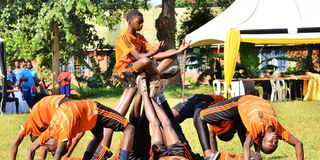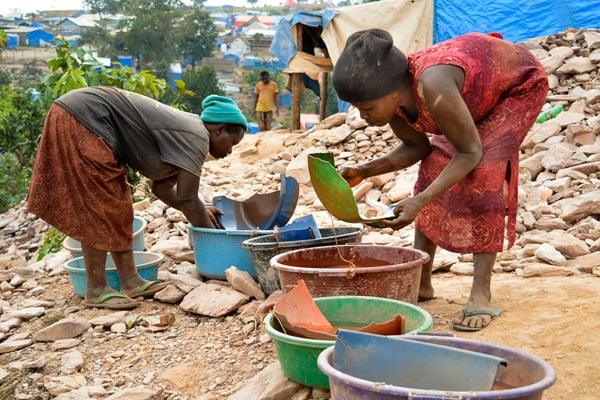Prime
Inaugural PE national festival promotes integration of PE in Schools

A 'ninja' meditating yoga at the PE National Festival. PHOTO/GEORGE KATONGOLE
What you need to know:
The one-day event served as a test of teachers' competence and aimed to promote the subject in schools across the country. Physical education is compulsory for Senior One and Two students under the new lower curriculum from 2022.
The Ministry of Education and Sports, in collaboration with the interim Committee for the Uganda Physical Education Teachers Association (PETA), has hosted the first-ever Physical Education National Festival at Kibuli Secondary School.
The one-day event served as a test of teachers' competence and aimed to promote the subject in schools across the country. Physical education is compulsory for Senior One and Two students under the new lower curriculum from 2022.
More than 130 teachers who had been oriented in January 2023 played a pivotal role in the success of the festival. These educators, who received training at Kibuli in 2021 and 2003, now serve as lead facilitators.
Representatives from eight of the 13 regions in Uganda, including Ankole, Acholi, Busoga, Central, Greater Masaka, Rwenzori, Bunyoro, Lango, and Mukono, participated in the festival. Unfortunately, West Nile, Kigezi, Teso, Karamoja, and Mbale missed the event.
Hajarah Ddembe, the Principal Education Officer for Physical Education and Sports widely recognised as the "Mother of Physical Education" stressed the importance of additional orientation on improvisation.
"The key to unlocking the full potential of physical education lies in continuous orientation on improvisation. By adopting physical education in more schools, we can ensure that students achieve meaningful milestones in their academic development," Ddembe said.
In her address, Jacqueline Basemera, representing the Permanent Secretary, emphasised that physical education is a deliberate effort to vocationalise education in Uganda. Basemera highlighted the utilisation of the competence-based curriculum for lower secondary, which promotes practical skills acquisition.
Physical education serves as a holistic tool that not only contributes to personal growth but also plays a vital role in the industrialisation of a nation.
The theme of the inaugural Physical Education National Festival, "Physical Education, a holistic tool, for personal growth and industrialisation," underscores the multifaceted benefits of incorporating physical education into the curriculum.
At its core, physical education nurtures personal growth by fostering physical fitness, health, and overall well-being.
Basemera encouraged stakeholders to address any gaps in the implementation of physical education, paving the way for a comprehensive and impactful program.
Inadequate facilities, very limited equipment, limited resources, high school enrolment per class as well as fewer values attached to PE are among the challenges faced by schools in the implementation of PE programmes.
Basemire noted that Teacher Training Colleges are now prioritising physical education, further bolstering the momentum for the subject across the country.
Physical activities among young people provide an opportunity to develop the values, and skills for an active lifestyle and high self-esteem.
She emphasised that physical education not only develops physical skills but also instills values and skills such as confidence in public speaking.
"Physical education goes beyond the realm of physical fitness; it imparts invaluable values and skills to students, including the development of confidence in public speaking," emphasised Basemire.
The inaugural Physical Education National Festival served as a platform for learners to showcase their practical skills and projects related to physical education.
Each of the regions presented a peer-facilitated physical education lesson and engaged in practical activities. The festival also featured exhibitions and fitness assessment sessions to engage and assess the participants' physical abilities.
The festival sets the stage for future events, which will become bi-annual with a minimum duration of three days. These festivals will help in promoting physical education, sensitising school communities, and increasing student participation in the implementation of the curriculum.




